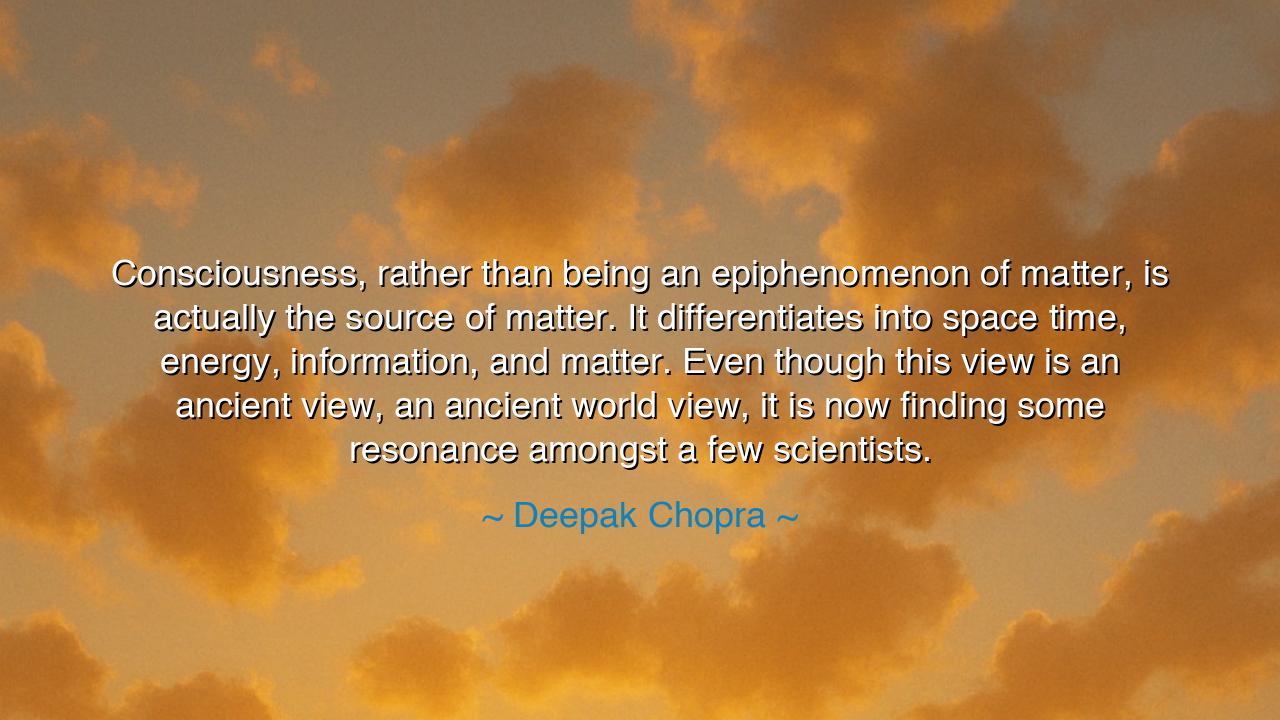
Consciousness, rather than being an epiphenomenon of matter, is
Consciousness, rather than being an epiphenomenon of matter, is actually the source of matter. It differentiates into space time, energy, information, and matter. Even though this view is an ancient view, an ancient world view, it is now finding some resonance amongst a few scientists.






In the vast expanse of the cosmos, where the mysteries of matter and consciousness intertwine, there exists a profound truth that echoes across the ages: consciousness is not merely a byproduct of physical processes but the source of all that we experience. As Deepak Chopra so eloquently states, “Consciousness, rather than being an epiphenomenon of matter, is actually the source of matter. It differentiates into space-time, energy, information, and matter.” This is not merely a philosophical idea; it is a reflection of an ancient worldview that sees the mind as the origin of all that is—everything that exists, from the tiniest grain of sand to the vast expanse of the universe, is born from the conscious awareness that transcends the physical world.
The ancients understood the primacy of consciousness in ways that modern science is only beginning to appreciate. In the great Vedic traditions of India, it was believed that the universe was born from Brahman, the eternal consciousness that pervades all things. The Upanishads spoke of Atman, the individual soul, as being inseparable from Brahman, the universal consciousness. These teachings posited that consciousness is not a product of the material world, but the very ground of being, from which space and time, energy, and matter emerge. This ancient understanding of the mind as the source of the material universe was not a speculative idea, but a profound realization about the interconnection between the inner world of awareness and the outer world of experience.
Just as Chopra points out, this ancient view is now finding resonance among a select group of modern scientists—those who are not content to view consciousness as a mere byproduct of neural processes or as a secondary phenomenon. Instead, they recognize that consciousness might be the fundamental essence from which all things arise. Quantum physics, in its pursuit to understand the deepest layers of reality, has uncovered strange and profound truths about the nature of matter and energy—truths that seem to suggest a non-locality of consciousness, as if the very fabric of the universe is deeply intertwined with the conscious observer. Like the great philosophers of old, these scientists are now finding that the universe may not be something that simply exists independently of us, but something that is created, shaped, and perceived by our awareness.
Consider the ancient Greeks, who also grappled with the nature of consciousness and the origins of the cosmos. Heraclitus, the philosopher of change, spoke of the Logos, a divine reason or principle that underpins all reality. To him, the world was in a constant state of flux, but it was also governed by an underlying consciousness—a force that brought order to the ever-changing chaos. Plato, too, with his theory of the Forms, suggested that the material world was merely a shadow of the higher, non-material realities, which could only be understood through the mind and reason. In this way, even the ancients recognized that the mind, or consciousness, was not a passive observer of reality, but an active participant in its creation and unfolding.
The story of Pythagoras offers another powerful example of the relationship between consciousness and matter. Pythagoras, the ancient Greek mathematician and philosopher, believed that the universe was governed by mathematical principles, and that these principles were not mere abstract concepts but the very fabric of reality itself. In his teachings, numbers and shapes were not just tools for understanding the world—they were the building blocks of all existence. This idea, that consciousness perceives and shapes the patterns of the universe, foreshadows the modern understanding that mind is not merely a passive receiver of information, but an active creator of reality.
In our modern age, Chopra’s assertion that consciousness is the source of all things challenges us to look deeper into the nature of reality itself. If consciousness is indeed the origin of matter, then we must question how we engage with the world around us. Are we passive participants in a world that exists independently of us, or do we shape and create the world with our awareness? If our thoughts and perceptions are not separate from the physical universe, but are the very forces that create it, then our consciousness is far more powerful than we often realize. We are not simply observers of the world; we are the creators of it, molding the fabric of reality with every thought, every feeling, and every intention.
The lesson we must take from Chopra’s words and the ancient wisdom is clear: we are the architects of our worlds. Consciousness is not a passive observer but the very source of all that we experience. Whether we choose to see it or not, the world we live in is shaped by our minds—our perceptions, beliefs, and desires. Thus, we must cultivate awareness and consciousness with great care. Just as the ancients sought to understand the nature of being through deep contemplation, so too must we engage in practices that expand our understanding and enhance our awareness. Meditation, mindfulness, and introspection are ways to align our consciousness with the deeper truths of the universe. By doing so, we become not just passive receivers of the world, but active creators of the reality we wish to experience.






AAdministratorAdministrator
Welcome, honored guests. Please leave a comment, we will respond soon